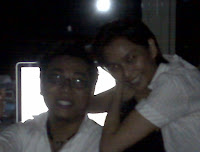 Ok so this post is late but I haven’t had the time to take part in Weekly Geeks for a while and thought I should do so this week. This time around, Weekly Geeks asks us to take a magical history tour with a focus on Historical Fiction. I’d like to share my views on the following question:
Ok so this post is late but I haven’t had the time to take part in Weekly Geeks for a while and thought I should do so this week. This time around, Weekly Geeks asks us to take a magical history tour with a focus on Historical Fiction. I’d like to share my views on the following question:
Do you have a favourite book that really pulled you back in time, or perhaps gave you a special interest in that period? Include a link to a review of it on another book blog if you can find one.
I don’t generally read a lot of Historical Fiction but I suppose Markus Zusak’s The Book Thief is currently one of the best historical fiction books that I’ve read so far. I did a review of the book sometime early this year and it really is one of best books I’ve read in 2009.
I think Zusak’s writing though simple, transported me back to the World War II era and provided a deep understanding of the sufferings experienced during that period. The losses, the inhumanity, the issues that the characters faced were real and brought a whole new understanding on the effects of war and injustice.
A couple of extracts from The Book Thief that I’d like to share which I thought help me understand the consequences of war.
On loss:
‘When they pulled her out, it’s true that she started to wail and scream for Hans Hubermann. The men of the LSE attempted to keep her in their powdery arms, but the book thief managed to break away. Desperate humans often seem able to do this.
She did not know where she was running, for Himmel Street no longer existed. Everything was new and apocalyptic. Why was the sky red? How could it be snowing? And why did the snowflakes burn her arms?’
On survival and suffering:
‘A few hundred miles north-west, in Stuttgart, far from book thieves, mayors’ wives and Himmel Street, a man sitting in the dark. It was the best place, they decided. It’s harder to find a Jew in the dark.
He sat on his suitcase, waiting. How many days had it been now?
He had eaten only the foul taste of his own hungry breath for what felt like weeks, and still, nothing. Occasionally, voices wondered past and sometimes he longed for them to knuckle the door, to open it, to drag him out, into the unbearable light. For now, he could only sit on his suitcase couc, hands under his chin, his elbows burning his thighs.’
On injustice:
On Himmel Street, Liesel was playing football when the noise arrived. Two boys were fighting for the ball in the mid-field when everything stopped. Even Tommy Muller could hear it.
‘What is that?’ he asked from his position in goal.
Everyone turned towards the sound of shuffling feet and the regimented voices as they made their way closer.
‘Is that a herd of cows?’ Rudy asked. ‘It can’t be. It never sounds quite like that, does it?’
Slowly at first, the street of children walked towards the magnetic sound, up towards Frau Diller’s. Once in a while, there was added emphasis in the shouting.
In a tall apartment just around the corner on Munich Street, an old lady with with a foreboding voice deciphered for everyone the exact source of the commotion. Up high, in the window, her face appeared like a white flag with moist eyes and an open mouth. She had grey hair. The eyes were dark, dark blue. Her voice was like suicide, landing with a cluck at Liesel’s feet.
‘Die Juden,’ she said. ‘The Jews’.
Some book reviews I found on The Book Thief :


















 Kudos to KL Tower for taking part in Earth Hour
Kudos to KL Tower for taking part in Earth Hour













